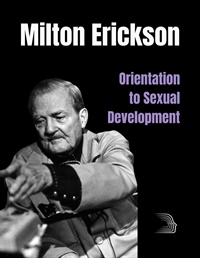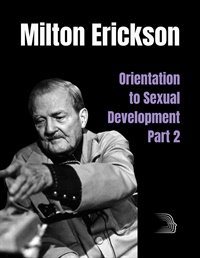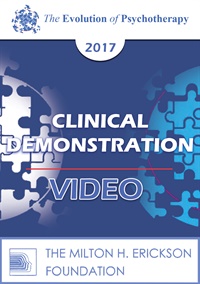Credit available - Click Here for more information
- Average Rating:
- Not yet rated
- Topic Areas:
- Sex and Sexuality | Couples Therapy | Ericksonian Hypnosis and Therapy Techniques | Milton Erickson | Children and Adolescent Therapy | Humor | Hypnosis
- Categories:
- Erickson Materials | Erickson Streaming Video Collection | Milton H. Erickson Collections | Online Continuing Education
- Faculty:
- Jeffrey Zeig, PhD | Milton H. Erickson, MD
- Course Levels:
- Master Degree or Higher in Health-Related Field
- Duration:
- 1 hour
- Format:
- Audio and Video
- Original Program Date:
- Jul 07, 2020
- Short Description:
- In this video, Dr. Milton Erickson describes sexual development — from infancy to adulthood, with a focus on male sexual maturation. As Erickson’s describes sexual development, the viewer feels as if they are going through the process as well. Erickson also includes humorous anecdotes of his children as they grew into adults. At the end of the video Dr. Jeffrey Zeig comments on Erickson’s fascinating teaching methods and communication techniques.
- Price:
- $19.95 - Base Price
Credit available - Click Here for more information
- Average Rating:
- Not yet rated
- Topic Areas:
- Milton Erickson | Sex and Sexuality | Ericksonian Hypnosis and Therapy Techniques | Experiential Therapy | Storytelling | Strategic Therapy | Hypnosis
- Categories:
- Erickson Materials | Erickson Streaming Video Collection | Milton H. Erickson Collections | Online Continuing Education
- Faculty:
- Jeffrey Zeig, PhD | Milton H. Erickson, MD
- Course Levels:
- Master Degree or Higher in Health-Related Field
- Duration:
- 1 Hour 8 Minutes
- Format:
- Audio and Video
- Original Program Date:
- Sep 24, 2020
- Short Description:
- In Part 2 of Dr. Erickson’s Orientation to Sexual Development, Milton Erickson continues his interesting lecture about the natural developmental processes involved with sexual/relational maturity. This video begins with Erickson telling charming stories of his sons sexually and relationally developing, which illustrate the principles outlined in the video.
- Price:
- $19.95 - Base Price
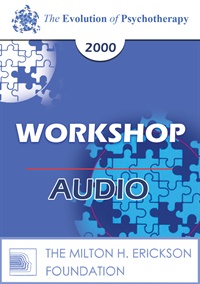
- Average Rating:
- Not yet rated
- Topic Areas:
- Ericksonian Psychotherapy | Neuroscience | Workshops | Ericksonian Hypnosis and Therapy Techniques | Psychotherapy
- Categories:
- Evolution of Psychotherapy | Evolution of Psychotherapy 2000
- Faculty:
- Ernest Rossi, PhD
- Duration:
- 2 Hours 33 Minutes
- Format:
- Audio Only
- Original Program Date:
- May 25, 2000
- Short Description:
- Neuroscientists have proposed that the next ten years be devoted to exploring cognitive approaches to facilitating neurogenesis in the hippocampus of the adult human brain. Let's do it!
- Price:
- $15.00 - Base Price
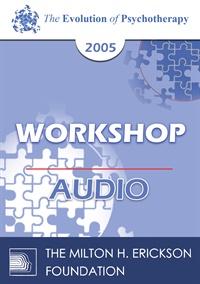
- Average Rating:
- Not yet rated
- Topic Areas:
- Workshops | Ericksonian Hypnosis and Therapy Techniques | Hypnosis | Arm Levitation | Psychotherapy | Ericksonian Psychotherapy | Neuroscience | Hypnotic Phenomena
- Categories:
- Evolution of Psychotherapy | Evolution of Psychotherapy 2005
- Faculty:
- Ernest Rossi, PhD
- Duration:
- 2 Hours 12 Minutes
- Format:
- Audio Only
- Original Program Date:
- Dec 07, 2005
- Short Description:
- Erickson's hand levitation and pantomime techniques have evolved into simple, easy to learn, activity-dependent approaches to therapeutic hypnosis, and are consistent with the theory and research of the current neuroscience on brain plasticity and the molecular genomic level of psychotherapy. Demonstrations with volunteers from the audience will illustrate.
- Price:
- $15.00 - Base Price
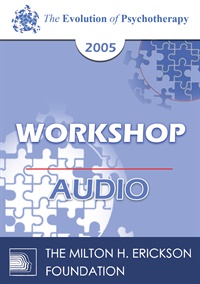
- Average Rating:
- Not yet rated
- Topic Areas:
- Workshops | Ericksonian Hypnosis and Therapy Techniques | Hypnosis | Psychotherapy | Therapist Development | Art and Creativity
- Categories:
- Evolution of Psychotherapy | Evolution of Psychotherapy 2005
- Faculty:
- Jeffrey Zeig, PhD
- Duration:
- 2 Hours 22 Minutes
- Format:
- Audio Only
- Original Program Date:
- Dec 08, 2005
- Short Description:
- Fundamental methods of Ericksonian hypnosis and psychotherapy will be presented and demonstrated. Experiential exercises will help attendees master essential concepts, that can be applied by clinicians of any persuasion to empower treatment goals.
- Price:
- $15.00 - Base Price
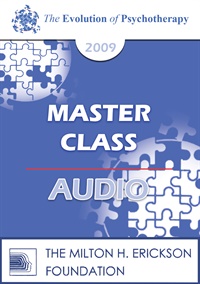
- Average Rating:
- Not yet rated
- Topic Areas:
- Brief Therapy | Experiential Therapy | Gestalt | Hypnosis | Psychotherapy | Ericksonian Hypnosis and Therapy Techniques | Hypnotherapy | Master Classes
- Categories:
- Evolution of Psychotherapy | Evolution of Psychotherapy 2009
- Faculty:
- Jeffrey Zeig, PhD | Erving Polster, PhD
- Duration:
- 2 Hours 49 Minutes
- Format:
- Audio Only
- Original Program Date:
- Dec 14, 2009
- Short Description:
- Gestalt therapy and Ericksonian hypnotherapy are experiential methods of change. In Combination they can be synergistic. Psychotherapy is best when clients have a first hand experience of an alive therapeutic process. Such dynamic empowering experiences pave the way for dynamic understandings. Drs. Polster and Zeig will engage with each other and the participants to examine commonalities and differences in their work.
- Price:
- $15.00 - Base Price
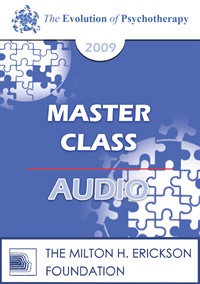
- Average Rating:
- Not yet rated
- Topic Areas:
- Brief Therapy | Experiential Therapy | Gestalt | Hypnosis | Ericksonian Hypnosis and Therapy Techniques | Hypnotherapy | Master Classes | Psychotherapy
- Categories:
- Evolution of Psychotherapy | Evolution of Psychotherapy 2009
- Faculty:
- Jeffrey Zeig, PhD | Erving Polster, PhD
- Duration:
- 2 Hours 42 Minutes
- Format:
- Audio Only
- Original Program Date:
- Dec 14, 2009
- Short Description:
- Gestalt therapy and Ericksonian hypnotherapy are experiential methods of change. In Combination they can be synergistic. Psychotherapy is best when clients have a first hand experience of an alive therapeutic process. Such dynamic empowering experiences pave the way for dynamic understandings. Drs. Polster and Zeig will engage with each other and the participants to examine commonalities and differences in their work.
- Price:
- $15.00 - Base Price
Credit available - Click Here for more information
- Average Rating:
- Not yet rated
- Topic Areas:
- Clinical Demonstrations with Discussant | Psychotherapy | Evocative Communication | Brief Therapy | Ericksonian Psychotherapy | Ericksonian Hypnosis and Therapy Techniques | Experiential Therapy | Strategic Therapy
- Bundle(s):
- Learning Track - EP17 Erickson Stream | EP17 Video Stream Build a Bundle
- Categories:
- Evolution of Psychotherapy | Evolution of Psychotherapy 2017 | Evolution of Psychotherapy Erickson Learning Track | Online Continuing Education
- Faculty:
- Jeffrey Zeig, PhD | Otto Kernberg, MD
- Course Levels:
- Master Degree or Higher in Health-Related Field
- Duration:
- 1:24:21
- Format:
- Audio and Video
- Original Program Date:
- Dec 14, 2017
- Short Description:
- Experiential components central to brief, strategic approaches to psychotherapy. We will compare and contrast Ericksonian and psychodynamic perspectives.
- Price:
-
Sale is $29.00
price reduced from Base Price - $59.00
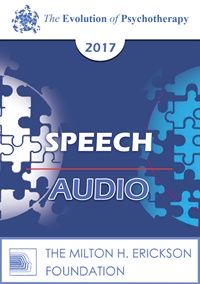
- Average Rating:
- Not yet rated
- Topic Areas:
- Speeches | Utilization | Ericksonian Hypnosis and Therapy Techniques | Hypnosis | Psychotherapy
- Bundle(s):
- Learning Track - EP17 Erickson Download | EP17 Audio Streaming Build a Bundle
- Categories:
- Evolution of Psychotherapy | Evolution of Psychotherapy 2017 | Evolution of Psychotherapy Erickson Learning Track
- Faculty:
- Michael Yapko, PhD
- Duration:
- 1:01:15
- Format:
- Audio Only
- Original Program Date:
- Dec 15, 2017
- Short Description:
- As advances are made in better understanding the power of focus in shaping one’s subjective perceptions and even physiology, the field of hypnosis has played an especially important role in this ongoing process of discovery. Despite too many clinicians’ terribly misinformed dismissal of hypnosis as little more than a gimmick, in fact hypnosis has evolved a strong scientific basis for its insights into neuroscience, cognition, suggestive language and information processing, placebo and nocebo responses, the therapeutic alliance, and more. Some of these insights and their clinical implications will be discussed.
- Price:
- $15.00 - Base Price
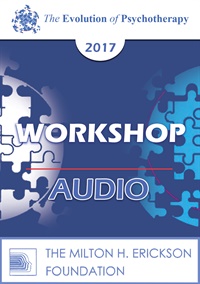
- Average Rating:
- Not yet rated
- Topic Areas:
- Workshops | Consciousness | Binds | Art and Creativity | Ericksonian Hypnosis and Therapy Techniques | Psychotherapy
- Bundle(s):
- Learning Track - EP17 Erickson Download | EP17 Audio Streaming Build a Bundle
- Categories:
- Evolution of Psychotherapy | Evolution of Psychotherapy 2017 | Evolution of Psychotherapy Erickson Learning Track
- Faculty:
- Ernest Rossi, PhD | Kathryn Rossi, PhD
- Duration:
- 2:38:21
- Format:
- Audio Only
- Original Program Date:
- Dec 13, 2017
- Short Description:
- MHE's 1965 paper "A Special Inquiry with Aldous Huxley into the Nature and Character of Various States of Consciousness" will be used so everyone can experience their personal version of Deep Reflection, the Double Dissociation Double Bind and the Quantum Qualia of their private consciousness and cognition for facilitating gene expression and brain plasticity to optimize their own growing edges.
- Price:
- $15.00 - Base Price
Please wait ...


